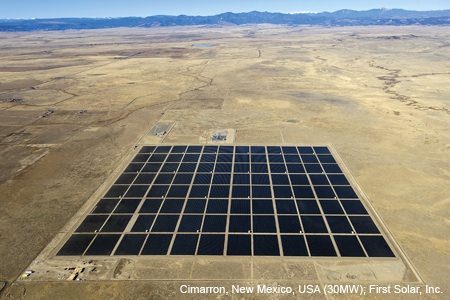The announcement of “restructuring” of the operations of First Solar last week showed that even the biggest companies are not immune to the impact of the shake-out in the solar manufacturing industry.
The leading thin-film solar producer said that it would close its manufacturing operations at Frankfurt in Germany in the fourth quarter of 2012 and indefinitely idle four production lines at its factory in Malaysia from 1 May 2012. This would involve a cut of 2,000 jobs, or 30% of the total. Restructuring and related charges could be as much as USD 370m, it said.
The changes could reduce the company’s manufacturing costs to as low as USD 0.60 per Watt by 2013 against the current estimated level of USD 0.74 per Watt, according to First Solar. The company was under pressure to reduce costs to remain competitive.
Thin-film solar modules are sold at a discount to crystalline silicon modules due to their lower efficiency, but the prices of the latter are falling fast, putting competitive pressure on thin-film producers. Shares in First Solar fell to an all-time low of USD 18.97 earlier this week in New York. This compares to USD 33.76 at the end of last year, and an all-time high of USD 317 in May 2008.
Solar manufacturing capacity worldwide exceeds demand significantly, and this has implications for future prices. According to Bloomberg New Energy Finance analysts, there is capacity across the value chain to make at least 44GW of modules, which is more than 50% in excess of expected demand this year.
A host of companies – from Solyndra in the US to Q-Cells in Germany – are in insolvency, hit by competition from manufacturers in China coupled with reduction in subsidies in the main markets in Europe.
“The solar market has fundamentally changed and we are quickly adapting our market approach and operations to maintain and build upon our competitive advantage,” said Mike Ahearn, the chairman and interim CEO of First Solar. The company intends to shift its focus from the markets in Europe towards new emerging markets like India and the Middle East.
Consolidation in such an industry would be inevitable. News reports last week said that China National Offshore Oil Corporation – better known as CNOOC – is in talks to buy solar module maker Canadian Solar, leading to a spurt in its share price. The company has a plant that makes solar cells in China.
Separately, Canadian Solar announced the formation of a joint venture with renewable energy project developer SkyPower that will develop solar farms, and provide an outlet for its products. The company will also pay CAD 185m for majority stakes in 16 projects that SkyPower is planning in Ontario.
The projects – totalling some 200MW – are expected to go into operation in 2014 and generate more than CAD 800m in revenue when they sell their power to Ontario Power Authority under 20-year contracts. Barring one, all the projects benefit from feed-in tariffs.
Securing supply contracts by buying stakes in developer-companies is also something that First Solar intends to do in the US.
In Asia, SunPower – majority owned by French oil company Total – announced that it would close one of its older manufacturing plants in the Philippines and shift production to newer factories to cut costs. The 125MW plant began working in 2004.
Even as the support that Chinese state owned institutions provide to their renewable energy companies is brought under the lens, solar module maker Yingli Green last week announced a “framework agreement” for USD 324m of funding from China Development Bank for a so-called trade platform in Hong Kong used to import raw materials.
The Chinese domestic market is expected to make up for some of the slack in the other large solar markets around the world this year. “China will be a very, very important market in 2012,” said Chen Kangping, chief executive officer of JinkoSolar Holding.
Another market that is perking up is Brazil, where the regulator announced rules for trading power produced by rooftop solar installations last week. Brazil has only one large-scale photovoltaic project in operation so far – a 1MW plant owned by MPX Energia.
European carbon gains steadily on supply curb rumours
European carbon allowances, or EUAs, for December 2012 delivery gained 2.6% last week, closing at EUR 7.44/t, up from EUR 7.25/t at the end of the previous week. EUAs rose steadily as EU officials hinted at potential reforms to restrict supply and boost prices. EU Energy Commissioner Guenther Oettinger said last Monday that officials need to “reactivate” the carbon market, while EU Climate Commissioner Connie Hedegaard said on Friday that she will propose a review of EUA auction rules before the end of this year. United Nations Certified Emission Reduction credits, or CERs, for December 2012 were unchanged last week as they closed at EUR 4.04/t.










